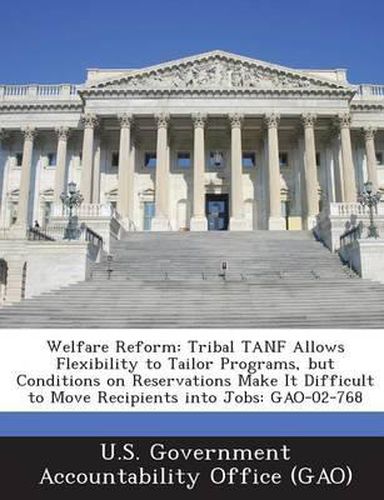Readings Newsletter
Become a Readings Member to make your shopping experience even easier.
Sign in or sign up for free!
You’re not far away from qualifying for FREE standard shipping within Australia
You’ve qualified for FREE standard shipping within Australia
The cart is loading…






The 1996 Personal Responsibility and Work Opportunity Reconciliation Act gives Native American Indian tribes the option to administer Temporary Assistance for Needy Families (TANF) programs, either alone or as part of a consortium with other tribes, rather than receiving benefits and services from state TANF programs. Because of the difficult economic circumstances on many reservations, the law also gives tribal TANF programs more flexibility than it gives to states. Tribes have used various strategies to stimulate economic development, but despite these efforts, unemployment and poverty rates on reservations remain high and prospects for economic growth may be limited. To improve economic conditions on reservations, tribes operate enterprises in a range of commercial sectors. Nationally, the number of American Indian families receiving TANF assistance has declined in recent years; however, in some states, American Indians represent a large and increasing share of the state TANF caseload. To date, 174 tribes, either alone or as part of a consortium, are administering their own TANF programs and have used the flexibility in the act to tailor their tribal TANF programs to meet TANF requirements. However, many tribes have found that TANF caseload and unemployment data on American Indians is inaccurate, complicating the determination of TANF grant amounts for tribal programs and making it difficult to design and plan such programs. Tribes also lack the infrastructure, such as automated information systems, to administer their programs efficiently. Because tribes lack experience administering welfare programs, they have turned to both states and the federal government for assistance.
$9.00 standard shipping within Australia
FREE standard shipping within Australia for orders over $100.00
Express & International shipping calculated at checkout
The 1996 Personal Responsibility and Work Opportunity Reconciliation Act gives Native American Indian tribes the option to administer Temporary Assistance for Needy Families (TANF) programs, either alone or as part of a consortium with other tribes, rather than receiving benefits and services from state TANF programs. Because of the difficult economic circumstances on many reservations, the law also gives tribal TANF programs more flexibility than it gives to states. Tribes have used various strategies to stimulate economic development, but despite these efforts, unemployment and poverty rates on reservations remain high and prospects for economic growth may be limited. To improve economic conditions on reservations, tribes operate enterprises in a range of commercial sectors. Nationally, the number of American Indian families receiving TANF assistance has declined in recent years; however, in some states, American Indians represent a large and increasing share of the state TANF caseload. To date, 174 tribes, either alone or as part of a consortium, are administering their own TANF programs and have used the flexibility in the act to tailor their tribal TANF programs to meet TANF requirements. However, many tribes have found that TANF caseload and unemployment data on American Indians is inaccurate, complicating the determination of TANF grant amounts for tribal programs and making it difficult to design and plan such programs. Tribes also lack the infrastructure, such as automated information systems, to administer their programs efficiently. Because tribes lack experience administering welfare programs, they have turned to both states and the federal government for assistance.